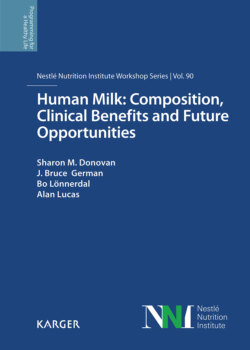Читать книгу Human Milk: Composition, Clinical Benefits and Future Opportunities - Группа авторов - Страница 24
На сайте Литреса книга снята с продажи.
Cognitive Development
ОглавлениеIn preterm infants, numerous observational studies have shown that use of HM in neonatal care is associated with higher IQ or DQ but, like the studies in full-term infants, such data do not prove causation. However, the opportunity to study this using an experimental design arose with our own RCTs in neonates whose mothers had elected not to provide their own breast milk (thus eliminating the potential confounding relating to mother’ choice to provide breast milk). These two trials compared as sole diets: (i) DBM versus preterm formula (PTF), and (ii) term formula (TF) versus PTF. The first of these trials, DBM versus PTF, compared HM with CM, but the CM arm (PTF) provided much higher protein and energy intakes. Nevertheless, the HM (DBM) group was not disadvantaged in later cognitive scores, suggesting that breast milk had factors that ameliorated the poor nutrient intake. In order to remove the major nutritional difference between these groups, we elected to compare DBM from trial (i) with TF from trial (ii) since these were diets both suitable for term infants. This cross comparison of RCTs was justified since both trials used the same PTF, thus constituting an “internal standard.” The HM (DBM) group had a significant 7-point advantage in the Bayley psychomotor index compared to the TF, providing compelling experimental evidence that HM promoted better cognitive development than seen in the CM (TF) group.
This finding is consistent with a rare RCT done in term infants – the Belarus trial – a cluster RCT done on over 17,000 mother-infant pairs. The intervention in breastfed infants was active breastfeeding promotion compared with no active promotion in the breastfed control group. A significantly longer duration of exclusive breastfeeding was achieved in the intervention group, which showed a 7.5-point advantage in verbal IQ at 6.5 years [30].
These two pieces of experimental evidence give weight to the view that studies that show an association between breastfeeding and superior cognitive outcome are causal.
